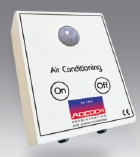Adding presence control to air conditioning

Adcock Air Conditioning & Refrigeration has developed a retrofit control system that automatically turns off air conditioning in vacated rooms. The standalone Attendant control system is designed specifically for split air conditioning and is compatible with all major air-conditioning systems. It can be battery or mains operated and monitor movement 24 hours a day.
The Attendant IR is programmed using the air-conditioner remote control, which then replicates the infra-red signal, allowing it to turn the air conditioning on and off when people enter or leave the room. The system is set to turn off automatically at a pre-set time after the room has been vacated.
An optional temperature-setting function prevents occupants using excessive heating or cooling. A setback feature will maintain room temperature in an energy-saving mode when the room is no occupied.
For areas where occupants are motionless for long periods of time, such as libraries or data-centre offices, an optional exit sensor can detect if people are still in the room and only turn off the air conditioning when the last person has left.
Intelligent software can be used with wireless window sensors and automatically turn off the air conditioning if a window is left open.








